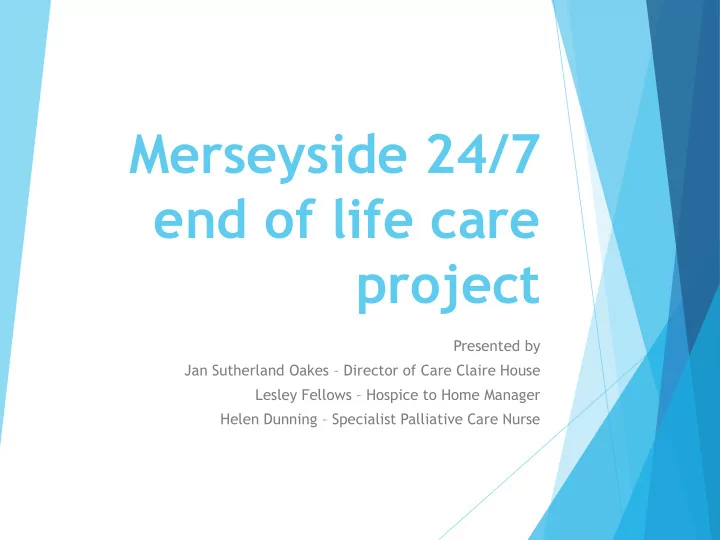

Merseyside 24/7 end of life care project Presented by Jan Sutherland Oakes – Director of Care Claire House Lesley Fellows – Hospice to Home Manager Helen Dunning – Specialist Palliative Care Nurse
Outline Palliative care developments – Merseyside & Cheshire Issues and challenges – pre project Opportunities Aim of the project Project Partners Delivery of project Benefits Project evaluation 2014/15 Summary
Palliative care developments – Merseyside & Cheshire 1 st Children's Community Nursing Team Liverpool 1992 • Alder Hey Macmillan Nurse Specialists 1992 • Claire House Children's Hospice 1998 • New Opportunity (Lottery) Funding 2002 • Specialist palliative care paediatrician & nurse consultant 2003 • Some investment in children’s community nurses (CCN) • Children & Young People’s Palliative Care Network established • DH £30 million to develops palliative care services for children • Better Care Better Lives 2008 • Pressure for greater investment in community nursing • Evolvement of other CCN services across Merseyside •
Issues and challenges – pre project Small number of deaths in each area (estimated 11 deaths per CCG) Unpredictable nature – peaks and troughs in disease trajectory Skills, confidence and competence – difficulties maintaining skills when exposure limited Changing roles for CCN’s e.g. GP referral, early discharge/admission avoidance Capacity to step up to 24/7 – often existing services are weekday/daytime cover Funding / financial constraints Sustainability – may need to provide EOLC for weeks/months
Opportunities Opportunity for economies of scale Merseyside QIPP Project Opportunity for statutory and voluntary sector collaboration 12 month funding secured through QIPP for Pilot Collaborative project plan developed and agreed
Aim of the project To develop systems to support 24 hour end of life care for children and young people in their preferred place of care - home; through collaborative partnership working between local and specialist services across NHS Merseyside and the voluntary sector (Claire House)
Partners in project Specialist Palliative care team Child Claire and GP House H2H service family Community children’s nursing teams
How did the project work operationally? Funding for project allowed additional human resources for the Hospice to Home team Steering group formed to oversee governance issues and track progress – included SPC Consultant; commissioners from NHS Merseyside CCG’s; CEO/Director of Care from Claire House; Project manager (H2H manager); Specialist palliative care nurse; CCN representation Stakeholder group formed to discuss cases and operational issues – Nurses from each CCNT; H2H nurses and SPCT Scoping exercise was undertaken to find
Cont …. Referrals flowcharts for escalation to the • 24/7 EOLC service Communication strategies – formalised a • shared handover of patients receiving EOLC; key communication messages Shared policy for partnership working • Togeth Developed key roles: er er • we achie ieve more - Lead service for end of life care for childre ldren - Specialist palliative care advisory role and famil ilie ies - Supporting community nursing role
Benefits Child/family Providers in the Commissioners project Home is always a Rapid access to Cost effective realistic option for EOLC specialist palliative care collaborative advice commissioning Continue to be Governance reassurance Insurance policy supported by local for lone working and approach services who know the medicines management child/family well Access to specialist Education and training Sustainability of services symptom assessment and for CCNT management 24/7 Access to therapy Rapid access to 24 hour services from Hospice, 7 day a week nursing counselling, play, music care and complementary therapies Sibling support Improved communication between teams due to collaborative working Single point of contact Financial investment to
Project Evaluation – March 2013-2014 Referrals Total number of nights of EOLC Knowsley 300 23% 23% South Sefton 200 100 23% 41% Liverpool 0 St Helen's Halton Outcomes Place of death Claire House Hospital 11% 10 22% 8 6 4 2 0 Home Died Care Ongoing 67% stepped Claire House Home Hospital down
End of Life care 2014/15
Summary The pilot evaluation presented to all 6 Merseyside CCG lead nurses & Commissioners Agreement reached that service provision was a cost effective option to providing a realistic and responsive 24/7 end of life care service Model facilitated realistic choice for end of life care at home Service commissioned across the 6 Merseyside CCG’s on a population basis Service specification and service level agreement Quarterly reports and annual overview Model of service provision / commissioning offers opportunity to support potential future funding models for palliative care NHS England potential funding options Population based Service based Outcomes and performance
Recommend
More recommend